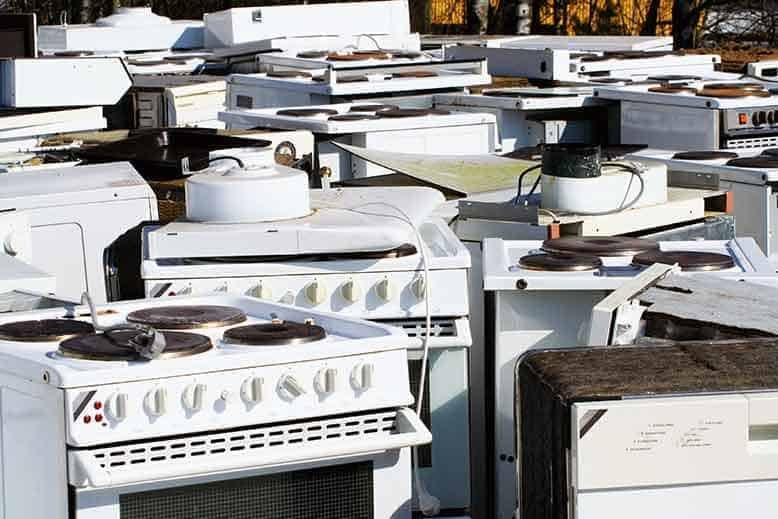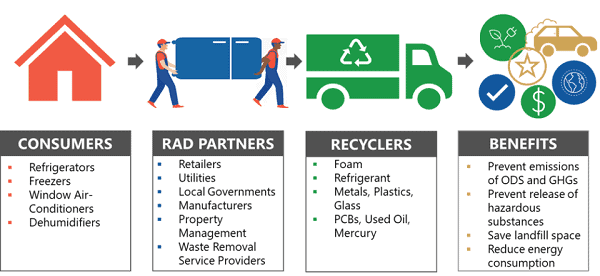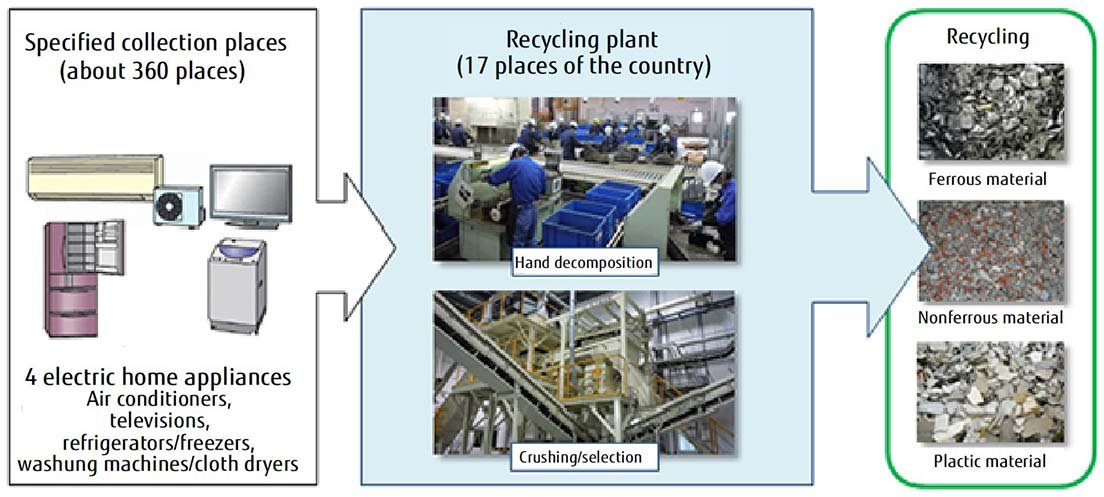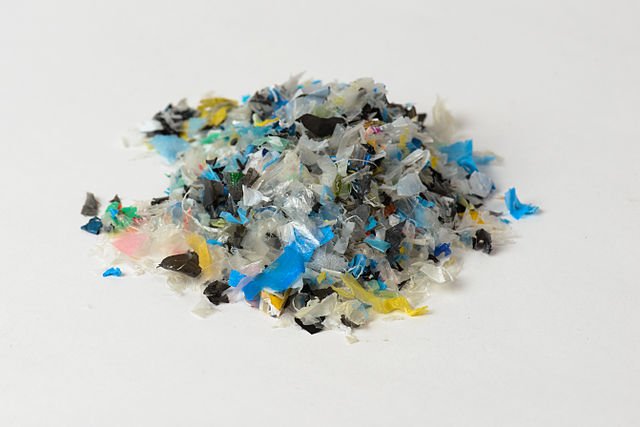Unveiling the Environmental Impact & Recycling Journey of Household Appliances
Behind the scenes of our everyday appliances lies a tale of transformation—a journey from obsolete to reimagined. When it's time to bid farewell to your trusted fridge or washing machine, their journey doesn't culminate in a landfill. Instead, it embarks on a recycling odyssey, a meticulous process designed to salvage hazardous materials, reclaim valuable metals, and tackle the overlooked challenge of recycling plastics. Join us as we unravel the complexities of this often-overlooked yet critical realm, where innovation meets environmental stewardship.
An overview of the recycling process
When it comes to recycling appliances there are three major parts to it. All hazardous materials need to be recovered and recycled. These are materials that can be dangerous to you or to the environment. Then the appliance is picked over for the various metals. And finally, the plastics that make up the appliance are recovered for future use.
Boring but important parts
Before we dig into how recycling your appliances works, we need to look at why. In the first article, we mentioned how dangerous it is to leave appliances just rotting. What you might not know is that there is an initiative put together by the EPA within the United States to work on this, because of how dangerous this is. Called the Responsible Appliance Disposal partners, companies partner together with the EPA to accomplish a series of goals. They aim to protect the ozone layer, cut greenhouse gas emissions from the improper disposal of appliances, and work to benefit communities by keeping appliances out of landfills, parks, and waterways.
Launched in October of 2006, RAD partners take the extra cost onto themselves to go above and beyond what federal law requires. Instead of just worrying about refrigerants like hydrofluorocarbon or the disposal of universal waste, instead, they look to recover insulation foam and to help remove older appliances from the secondhand market.
Between 2007 and 2018, RAD partners have accomplished the following:
Diverted 1.06 billion pounds of ferrous metals and 88 million pounds of non-ferrous metals from landfills;
Recycled 196 million pounds of plastic;
Recycled 30 million pounds of glass.
They’ve facilitated the proper handling of:
765,000 gallons of used oil; and
319,000 PCB and 196,000 mercury-containing components.
Hazardous Materials
Depending on the age of your appliances, they can contain everything from mercury to used oil to polychlorinated biphenyls as well as ozone-depleting substances and hydrofluorocarbons.
That's a lot of complex chemicals that all boil down to dangerous for you, the water system, and everything that we eat. So, it makes sense that removing it is a top priority when it comes to recycling major appliances. These materials are recovered and recycled for future use either into new appliances or other everyday items.
Not only do we benefit from being reused and kept out of our farms and foods, but by recycling these, we don't have to spend the fuel to dig up more or process the raw materials.
One material that we didn't mention but is present in your refrigerators and freezers is insulation foam. The type used most often contains hydrofluorocarbons, and if left to break down or be degraded, would also be dangerous to the atmosphere. However, a new technology allows for that foam to be turned into pellets. These pellets can then be burned for fuel safely and used to fuel other parts of the recycling process.
Metals
Your appliances, large and small, contain a large variety of metals. Copper, aluminum, steel, all of these are recyclable. They can be reused either in making new appliances, other electronic circuits or any of a thousand other items that you come in contact with throughout the day.
After, say, your refrigerator is broken down and stripped of all its hazardous materials, it gets shredded by large machines with many teeth. They rip all of the pieces down into pieces small enough to float on water. First, the danger confetti is gone over with a magnet. This pulls out the steel from the pile that can be set aside and use later. Unfortunately, we still have a large pile of mixed plastics and metals that do not respond to a magnet. So all of this gets dumped into water. The pieces are sorted using their density and ability to float to separate out the metals from the plastics. The plastic confetti gets sorted into the next step while the copper and aluminum stay here, along with any other metals, to be melted down and reused.
Plastics
For a very long time, appliance recycling stopped at recovering the hazardous materials and the metals. The plastics weren't seen as important. People didn't care that they were clogging up landfills and being utterly useless. Fortunately, others have stepped in and seen the necessity of change.
From the environmental aspect, you probably don't like eating plastic or the idea of your family eating plastic any more than the next person. And we highly doubt that you like the idea of your pets eating it either. Unfortunately, microplastics, or pieces of plastic that are less than 5 mm in size, have shown up everywhere. In waterways. In farms. In animals, land, sea, and air. On mountain tops, ages away from where they initially started. And most frighteningly in your blood. We don't say this to frighten anybody. This is, unfortunately a statement of fact. And leads us back to the reason why plastic recycling is necessary.
Fortunately, the company Hitachi is leading the way. Not only are they working in Japan but also abroad, trying to find ways to recycle as much appliance plastic as possible. The use of plastics in home appliances is widespread and extensive. While it varies from appliance to appliance, at least 40% of most appliances is plastic. Plastics are made from crude oil and their market prices are affected by more than merely supply and demand. Politics, economics, and speculation all affect the price as well. With the rising demand for crude oil and the prices on a long-term upward trend, with every passing year, stable sources of plastic materials are becoming more difficult to obtain.
Because of that, and additional issues within Japan specifically, Hitachi is looking at ways to increase the ability to recycle plastics. They do this by sorting through the various types of plastics within major appliances. Polypropylene, polystyrene, and acrylonitrile butadiene styrene makeup between 70 to 80% of the plastics used in home appliances.
Polypropylene and general-purpose polystyrene are easy to identify. They're easy to find and easy to recycle. This makes them more valuable, so most shops will have dedicated crushers for these two plastic types.
Remember the plastic confetti we mentioned earlier? This is where that comes back into play. Once the polypropylene and general-purpose polystyrene are pulled out you're left with a mixed bag of plastic confetti that still needs to be sorted. Previously this process would be done by hand if it was done at all. Hitachi is working on speeding up the process. They hope to install sorting equipment that can separate mixed plastics into individual types using water and electrostatic separation.
(Sidenote: If you're interested in the process of removing microplastics, that is a bit beyond the scope of our coverage on this site, but we do suggest some of the links we've left in the additional reading section. One from National Geographic explains the situation, and the other from Princeton discusses exciting research toward solving it.)
Stepping back from the intricate process of appliance recycling, we're left with a profound realization of its undeniable significance. Recycling isn't just a mundane chore; it's a vital cog in the wheel of environmental preservation. Don't forget to revisit our previous article to deepen your understanding of the recycling journey. And keep an eye out for the forthcoming installments in this series, where we'll continue unraveling the compelling narrative of sustainable appliance management.
While recycling remains a pivotal solution, prevention is equally crucial. At Appliance Rescue Service, we're committed to prolonging the lifespan of your appliances, offering maintenance and repair services to keep them running efficiently. Whether it's a need for immediate repairs or a desire for a routine maintenance check, take the proactive step towards sustainable appliance care. Contact us today to schedule an appointment or visit our website for more information on how we can assist in maintaining your appliances for a greener, more efficient household.
Call us at: (214) 599-0055
Additional Reading
Explaining The Basics Of Appliance Recycling
New Research On Removing Microplastics







